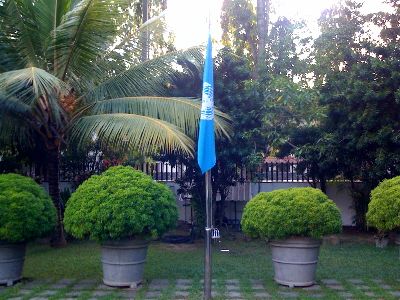Lately, I have been asked about UN Internship Programmes a few times so I would like to share some information about these programmes. Please note that I’m not providing this information on behalf of the UN or any UN organization but merely as a private person. So the best advice I can give is to stick to the official resources.
Many UN organisations offer internships. You can check out the UN’s Internship Programme. Typically, for an internship you need to be “graduate [or] post-graduate studentâ€. The official site is not listing specific subjects you need to study in order to be eligible but refers to “diverse academic backgrounds†so check the openings of the UN for details on who they are looking for. On the UN’s website are more links to Geneva, Vienna, Nairobi, Addis Ababa, Bangkok, Beirut, Santiago, Arusha, and The Hague based internships but the opportunities don’t stop there: Many organizations in the UN system offer internships, too.
Just to name a few UNDP, UNICEF, and UNOPS all have internships. So, if you would like to know which organizations exist in the UN system refer to the UN Organisational Chart and find the website of the organization you are interested in. Then, see if this organization offers internships (many do) and work your way down from there.
Aside from general internship programmes, some internships are also advertised similar to regular jobs. These opportunities are also picked up by the UN Job List, so it is a good idea to search the UN Job List for internships.
A few items to keep in mind
- Know what you want: Don’t approach an organization only because you came across their website and saw an opening there. Make sure you know as much as possible about the organization. So read up on their goals, their activities, their approaches etc. as much as you can. Try to understand what expertise the organization may need and ask yourself if you fit these profiles.
- Know what you apply to: In case you apply to an internship opportunity and even if you understand what the organization is about, make sure you understand the specific opening well. Read the opening several times and try to understand where in the organization the internship would be. Apply if you think you are a good fit.
- Know how to apply: Read the advert carefully and make sure you fulfill all the formal criteria you need to fulfill for the opening. Also, make sure that your application speaks to why you specifically should get the internship. Explain your CV and your motivation and how you could contribute to both the specific internship opening and the overall organization’s needs. At the same time, keep it short and concise. The strength of your argument should not depend on the length of your cover letter.
Also keep in mind that
- Internships are unpaid and that if you need a visa etc. the logistics and administration is often times up to you.
- Internships vary in duration. Many organizations have internships from 2 months to 6 months. Check with the organization you are interested in and see what works for them. Sometimes you seem to be able to negotiate a timeframe.
- Internships are a great way to get some inside into an organization. However, don’t expect to get a job in the UN through an internship. Many organizations have ‘black-out’ periods after an internship in which you are not eligible to apply for any job at the organization you just interned with.
All of this should give you a start in finding an internship with the UN. Expect the overall process to take a bit of time and don’t be discouraged if you don’t succeed immediately. Many internships are very high in demand and it is quite possible that you don’t hear back from the organization if you’re not selected.
Having said all this, interning at a UN organization is a great way to learn about the inner workings of the UN system and a great overall experience. Good luck internship hunting!
PS: Please don’t ask about specific job / internships in the comments: I don’t have any more information about opening than the information on the UN Job List. Thanks!


